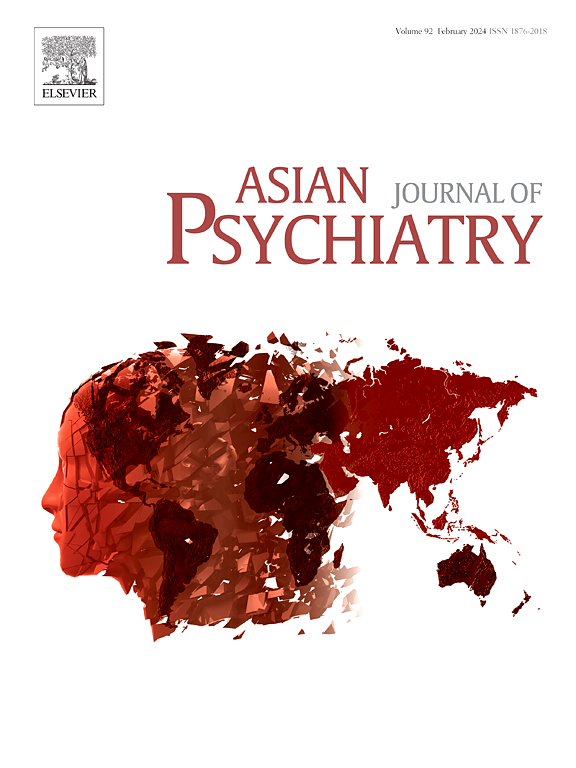Validation of the Russian version of the Adult Rejection Sensitivity Questionnaire (A-RSQ): Factor structure and associations with psychological constructs
IF 4.5
4区 医学
Q1 PSYCHIATRY
引用次数: 0
Abstract
This study aimed to translate and validate the Russian version of the Adult Rejection Sensitivity Questionnaire (A-RSQ). A total of 407 Russian-speaking adults (53.3 % men; aged 18–74, M = 40.89, SD = 11.03) completed the A-RSQ and a battery of psychological scales, including the Depression Anxiety Stress Scales-21, Brief Fear of Negative Evaluation, Hikikomori Questionnaire-25, Existential Isolation Scale, and Emotional Dysregulation Scale. For factor-structure validation, the sample was randomly split into EFA (n = 213) and CFA (n = 194). Exploratory factor analysis supported a two-factor model (Rejection Concern and Rejection Expectancy), both subscales showing good internal consistency (α ≥.83). Confirmatory factor analysis (WLSMV; ordered-categorical items) showed acceptable incremental fit with elevated RMSEA (CFI =.960, TLI =.954, RMSEA =.095, SRMR =.073) and a negative latent correlation between factors (r = −.44). Test–retest reliability over a four-week interval was acceptable (r = .79). Correlations with external constructs supported convergent validity, revealing distinct associations between A-RSQ components and depression, anxiety, social withdrawal, and interpersonal sensitivity. Exploratory analyses by sex and age revealed that men scored higher on the total A-RSQ and the Rejection Expectancy subscale, while Rejection Expectancy also showed a small age-related decrease.
These findings support the use of the Russian A-RSQ as a psychometrically valid instrument for assessing rejection sensitivity and its associations with emotional and interpersonal maladjustment.
俄文版成人排斥敏感性问卷(A-RSQ)的验证:因素结构及其与心理构念的关联。
本研究旨在翻译并验证俄文版成人排斥敏感性问卷(A-RSQ)。共有407名俄语成年人(53.3 %,男性,18-74岁,M = 40.89, SD = 11.03)完成了A- rsq和一系列心理量表,包括抑郁焦虑压力量表-21、短暂的负面评价恐惧、隐匿青年问卷-25、存在隔离量表和情绪失调量表。为了进行因子结构验证,将样本随机分为EFA (n = 213)和CFA (n = 194)。探索性因子分析支持双因子模型(拒绝关注和拒绝期望),两个分量表均具有良好的内部一致性(α≥0.83)。验证性因子分析(WLSMV;有序分类项目)显示RMSEA升高的增量拟合可接受(CFI = 0.960, TLI = 0.954, RMSEA = 0.095, SRMR = 0.073),各因素之间的潜在负相关(r = - 0.44)。四周间隔内的重测信度是可以接受的(r = .79)。外部构式的相关性支持收敛效度,揭示了A-RSQ成分与抑郁、焦虑、社交退缩和人际敏感性之间的显著关联。性别和年龄的探索性分析显示,男性在总a - rsq和拒绝预期量表上得分更高,而拒绝预期也显示出与年龄相关的小幅下降。这些发现支持使用俄罗斯a - rsq作为心理测量学上有效的工具来评估拒绝敏感性及其与情绪和人际关系失调的关系。
本文章由计算机程序翻译,如有差异,请以英文原文为准。
求助全文
约1分钟内获得全文
求助全文
来源期刊

Asian journal of psychiatry
Medicine-Psychiatry and Mental Health
CiteScore
12.70
自引率
5.30%
发文量
297
审稿时长
35 days
期刊介绍:
The Asian Journal of Psychiatry serves as a comprehensive resource for psychiatrists, mental health clinicians, neurologists, physicians, mental health students, and policymakers. Its goal is to facilitate the exchange of research findings and clinical practices between Asia and the global community. The journal focuses on psychiatric research relevant to Asia, covering preclinical, clinical, service system, and policy development topics. It also highlights the socio-cultural diversity of the region in relation to mental health.
 求助内容:
求助内容: 应助结果提醒方式:
应助结果提醒方式:


